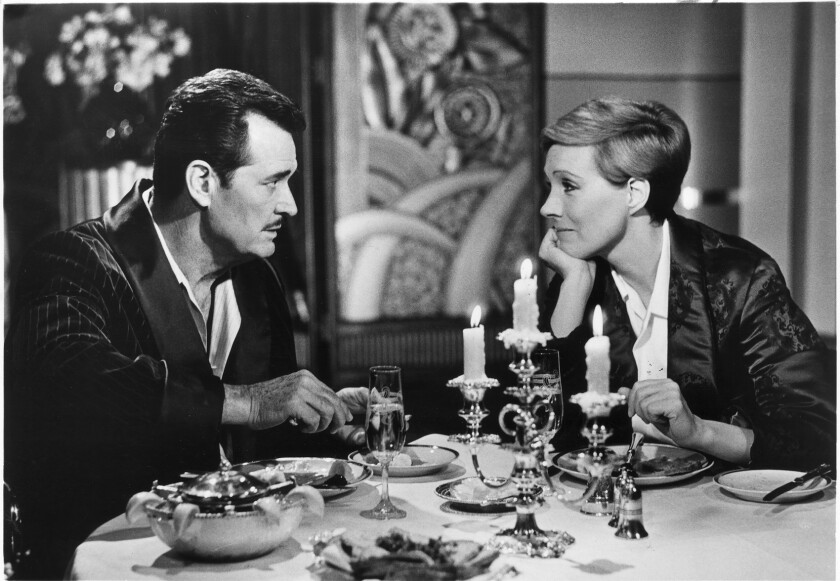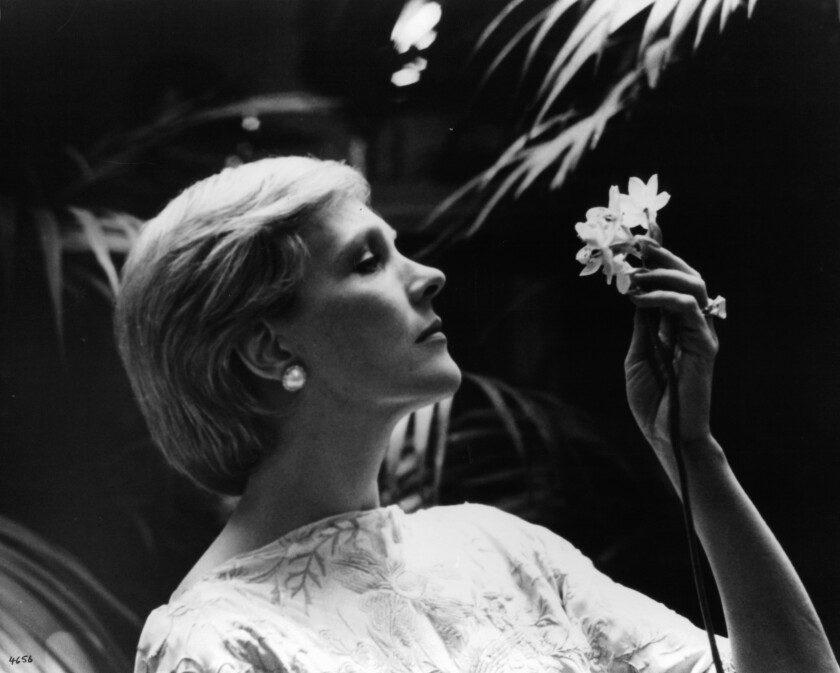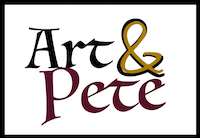
Over the past year, Julie Andrews made headlines on at least two separate occasions — one hilarious, one terrifying, and both thoroughly indicative of just how beloved she remains.
I’ll save the hilarious one for later. The terrifying one appeared in this newspaper, or rather in a message from its Twitter account. A May 4 @LATimes tweet read: “Julie Andrews, the legendary singer, actress and star of ‘Mary Poppins,’ ‘My Fair Lady’ and ‘The Sound of Music,’ is writing a memoir that will detail her experiences in Hollywood.” It was an inspiring bit of news that, due to some unfortunate phrasing and burial of the lede, led more than a few Twitter users to think they were about to read an obituary.
The panic was widespread and immediate. The relief that followed was tinged with anger. How dare we frighten, even briefly, those who have long been captivated by Andrews and her singular wit, impeccable diction and clear-as-a-bell voice, those who grew up with “Mary Poppins” and “The Sound of Music” in heavy household rotation.
I do not mean to fall into the usual trap of reducing Andrews’ career to her two best-loved roles, even if it is a mistake to which she herself must be more than accustomed by now. In her charming new memoir, “Home Work” — the book that prompted the offending tweet — she briefly mentions her own initial apprehension at following “Mary Poppins” so quickly with “The Sound of Music,” of playing two genially mischief-making, musically gifted nannies in a row. And that was before she had won her Oscar for “Mary Poppins,” or had any inkling of just how successful and enduring both pictures would become.
But if Andrews experienced any later resentment at not being able to escape the shadow of her first two major movie triumphs, she doesn’t let on here. Her focus, as the title of the book emphasizes, is on the work, and particularly on the difficulties of the work. Her tone throughout is brisk, matter-of-fact and endlessly self-deprecating (“I kept feeling that I hadn’t done it justice,” “I saw places where my lack of experience showed through,” etc.), punctuated by the occasional flight into effusive gratitude.
Even when she recalls a moment when she had legitimate cause for bitterness — when she was passed over for the role of Eliza Doolittle in the movie of “My Fair Lady,” a role she had originated on Broadway — she chooses to see the silver lining. (Since the rejection freed her to do “Mary Poppins” and win an Oscar, she admits, that particular lining was more silver than most.)
Andrews’ reminiscences of “Mary Poppins” are mainly focused on the enormously hard work she put into it, the intensity with which she threw herself into her singing, dancing and especially acting. She acknowledges she was operating from a place of insecurity, as a rigorously stage-trained performer approaching this strange new cinematic medium for the first time and not wanting to screw up. At one point she quotes her singing teacher Lilian Stiles-Allen: “The amateur works until he can get it right. The professional works until he cannot go wrong.”
If there is a lesson here, it isn’t just that practice makes perfect; it’s that humility begets authority. As a character, Mary Poppins embodies both. She endures, of course, because of her cheeky superiority, her bone-deep assurance that she is practically perfect in every way. But in Andrews’ exquisitely judged performance, what might have played like mere primness or arrogance instead emerges as something so much more human and delicate and understated. Mary Poppins sees and understands too deeply to allow her superiority to curdle into contempt. Her attitude toward the fragile, all-too-human family in her care is full of tenderness, informed by the knowledge that her time with them will be short. She knows the depths of her power, but she also knows its limitations.
More than a few of Andrews’ most memorable characters seem to embody a similar tension, even if they lack Mary Poppins’ self-possession and wrestle with far more anxiety. Many of them don’t know the full extent of their abilities and have to be coaxed or badgered into realizing it. And more often than not, to hear her own words, Andrews had to undergo a similar evolution behind the scenes. (Sometimes, she notes, she could be unnecessarily candid about her own flaws, as when she criticized her performance in “Torn Curtain” in an interview, to Alfred Hitchcock’s chagrin.)
Consider “The Sound of Music,” in which a hapless young nun named Maria runs, skips and sings “I have confidence in me!” only to arrive trembling and uncertain at the house where she will be serving as governess to seven children. Her confidence ebbs and flows and finally surges throughout the film; she’s forced to confront her fears, including the thrilling, terrifying realization that she might be in love. Andrews had just played a British war widow coming to terms with a similar realization when she falls for a U.S. admiral (James Garner) in “The Americanization of Emily” (1964). This World War II-era romance, with its sparkling Paddy Chayefsky script, remains one of Andrews’ most appealing and undersung movies, not least because its central romance feels like a metaphor for just how quickly this English actress managed to conquer the hearts of the American public.
Julie Andrews and James Garner in “The Americanization of Emily” (1964).
(MGM/Kobal/Shutterstock)
Andrews writes in vivid detail in the book about the behind-the-scenes anxieties she confronted during this early period of her Hollywood career, from learning music to knowing how to hold a close-up. She had long since mastered these difficulties by the time she appeared in “S.O.B.,” an acrid 1981 satire of the film industry written and directed by her husband, Blake Edwards. Andrews played Sally Miles, a singer and actress who was drolly modeled on her own wholesome English musical persona but was designed in some ways to shatter it. “S.O.B.” is too often recalled as a punchline, the movie in which Andrews scandalized her fans by baring her breasts onscreen — an episode that Andrews neither waves away nor overindulges, instead treating it as she treats every acting challenge: as an opportunity to confront fear and display professionalism.
An even richer challenge awaited her in “Victor/Victoria,” the elegant and witty 1982 romantic farce that Edwards wrote and directed after “S.O.B.” Andrews plays Victoria, a starving soprano in 1934 Paris who is gradually goaded into the perfectly ludicrous scheme of impersonating a man impersonating a woman. Being a movie about acting, it’s also the rare picture in which both character and actor seemed to be undergoing the same struggle, namely severe doubt as to whether she could convincingly pass for a man.
Julie Andrews and James Garner reunited for 1982’s “Victor/Victoria,” a romantic comedy written and directed by Blake Edwards.
(MGM)
Despite Edwards’ assurances (“Honey, your audience will believe that Victor is a man because the audience onscreen believes it”), Andrews proceeded to hurl herself with the usual fervor into her preparation and research. She studied the nuances of male posture and movement, looking for clues and mannerisms that she could absorb. But her enchanting performance, still one of her finest, does not succeed or fail on the strength of its impeccable mimicry. By that point in her career, she had long mastered the kind of effortless rapport with the camera that is every movie star’s birthright. You might say she worked until she could not go wrong.
Andrews has receded from the Hollywood limelight in the years since, though whenever she has returned to it, the audience takes a boundless, almost Pavlovian pleasure at seeing and hearing her again. Nearly every character she’s taken on — whether it’s an affably imperious queen in “The Princess Diaries” or a voice role in one of the “Shrek” or “Despicable Me” movies — demonstrates both a wonderfully wry playfulness and a keen understanding of why the audience loves her. There’s humility in that awareness, and authority, too.
Julie Andrews in “S.O.B.” (1981).
(Paramount/Getty Images)
Which brings us, finally, to that hilarious headline. It happened a few months before the December 2018 release of “Mary Poppins Returns,” Disney’s 54-years-later sequel to “Mary Poppins.” Reports emerged that she would not be making a cameo appearance in the new movie — not, as some suggested, out of contempt for the project but because she supported it and didn’t want to distract from Emily Blunt’s performance as Mary 2.0. The delicious, surprising kicker: Andrews did, however, have a credit in another blockbuster that holiday season, “Aquaman.” She voiced the role of an ancient, enormous, many-tentacled, spiky-tailed sea monster known as the Karathen.
History has already vindicated this delightful decision, and not simply because as fantasy filmmaking goes, the blissfully out-there “Aquaman” puts to shame the imperfect-in-every-way “Mary Poppins Returns.” It’s an unmitigated joy to know that it’s our beloved Julie Andrews giving voice to that ugly underwater behemoth, snarling things like “You dare come here with your tainted mongrel blood to claim Atlantis’ greatest treasure!,” her crisp intonations and clear-as-a-bell voice still unmistakable beneath layers of digital gravel. Who knows what she’ll do to surprise herself and her fans next, but I have confidence she will.
Justin Chang is a film critic for the Times.
If you go: Julie Andrews
The Los Angeles Times Book Club and the Ideas Exchange welcome Julie Andrews in conversation with columnist Mary McNamara about “Home Work.”
When: 7:30 p.m., Nov. 18.
Where: Orpheum Theatre, 842 S. Broadway, Los Angeles.
More info: latimes.com/bookclub








